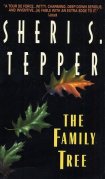 The Family Tree, Sheri S Tepper (1997)
The Family Tree, Sheri S Tepper (1997)
Review by Cheryl Morgan
The Family Tree opens with Dora Henry, a detective sergeant with the local police, coming close to having a nervous breakdown at her front gate. The source of her distress is a weed disfiguring the neatly paved path. Not that Dora cares, but her husband, Jared, will be furious. Jared is tidy and organised; obsessively so. Provided that everything in his life is in its place and in order he is happy. Should anything be usual, such as Dora failing to serve dinner at precisely the right time and providing exactly the right meal cooked exactly as Jared’s mother would have cooked it, he gets very angry. So far, a typical Tepper.
But wait, the second chapter takes place in a harem in a fantasy world which, we later discover, exists 3000 years into the future. It tells how Opalears, an orphaned servant girl, is selected to accompany Sultan Tummyfat’s favourite son, Sahir, on a journey to the far off monastery of St. Wheel, ostensibly in search of a cure for the Prince’s mysterious illness. What is going on here?
Two things seem obvious immediately. First, this is one of Tepper’s little side projects. It has the same, light, humourous touch as Beauty, and that may just mean that it is not quite as depressing as usual. It also seems certain that the two storylines, which alternate chapters for much of the first half of the book, will eventually merge. And so they do, at which point…
Were I an American I would say that Tepper throws a curve ball. But Americans, being innocent of cricket, know little of the magic that can be achieved with a raised seam, a part-polished surface and the option to let the ball bounce. Most of them have never even heard of Shane Warne. What Tepper does is the literary equivalent of the Shane Warne Mystery Ball. Having seen it, you are consumed with the need to go back and watch the replay again and again to try to figure out how she did it and why you never saw it coming. But you know that no amount of study would save you if another one came your way. It is just too well disguised.
There’s not a lot more I can say about the plot because to do so would completely spoil the surprise for you. I can, however, address the usual questions one would ask about a Tepper novel.
First the good news. This is the first of Tepper’s novel for ages which treats the sexes fairly. There are male characters who are perfectly normal, even nice. Abby McCord, the biologist, and Prince Izakar, the young sorcerer that Opalears and Shair meet on their travels, are positively charming at times. Even the awful Jared turns out to have an excuse of some sort for his behaviour. Equally importantly, there are stupid and bad women. Dora’s mother spent her life rushing from one pregnancy to another, partly on the grounds that being pregnant excused her from having to look after the children she already had. The police lieutenant says his wife won’t feel safe from animals until the whole world is paved over. Jared’s mother is clearly the source of much of his obsessive tidiness. It is, at last, a book full of real people rather than sex war stereotypes.
The bad news is that the Great Disaster is still with us. Jared’s weed shows no sign of wanting to be killed, and is soon taking over America. Izakar’s history tells him that his pseudo-mediaeval society came into being after a great plague destroyed most of mankind. I think I have run out of excuses. Tepper really does believe that most of us deserve to be sentenced to death for crimes against the planet.
The ending of Gibbon’s Decline and Fall worried me. In it, Carolyn was given the opportunity to make a fundamental change to the nature of the world, something that would affect every single human on the planet. She appeared to make her choice with very little thought of the morality of what she was doing. In Plague of Angels we saw only the aftermath of such a decision, and in Shadow’s End it was God who decided so the moral question was moot. It is about time that Tepper faced up to the consequences of her politics. In The Family Tree, at last, she makes a start.
I think one of the reasons I enjoy Tepper’s book so much is the consistency of theme and the constantly developing moral theories. This one, however, has a lot more to recommend it. It is light-hearted, amusing and lacking in much of the obvious nastiness of her other work. Only in the tail is the sting discovered. Highly recommended, especially to those of you with an interest in animal rights.
This review originally appeared on Emerald City.
